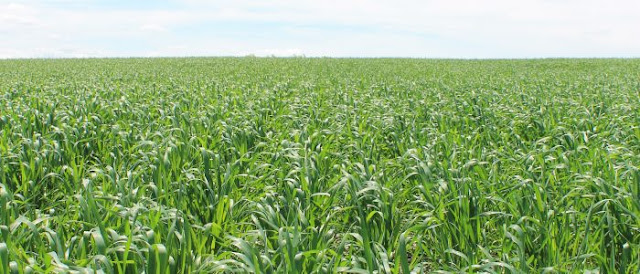Climate change is one of the most extreme challenges Indian agriculture is facing today and will have to deal with in the future. There has been overwhelming and growing scientific evidence to establish that the world is getting warmer due to climate change and such increasing weather variabilities and worsening extremes will impact the agriculture sector more and more adversely.
 |
| Weather Impacts on Wheat and Rabi Crops |
The crops don't get enough sunlight due to which the photosynthesis process slows down which impacts the growth of the crops. As of now the effect of fog is not much on the mustard crop but complaints of white rust on mustard plants are coming in from some areas of North and Western India. The gram crop has also not been affected much because of fog but in such a condition due to lack of photosynthesis, the growth of the crops gets affected. Due to the severe cold conditions and fog have made potatoes prone to late blight and got informed from some areas of Uttar Pradesh and Punjab.
This season, the favorable weather follows timely sowing of wheat and a marginal increase in acreage — it is pegged at around 29 million hectares — which would reflect in output. Wheat is the main rabi crop, sown in October and harvested around April. There has been a perceptible drop in temperature in central states including Madhya Pradesh and even in Maharashtra which is highly favorable for the crop of wheat. Farmers can apply light and frequent irrigation in corps to protect the crop from frost and cold injuries and also there may be light rain in the coming week over northern and western parts of the country so apply need-based irrigation in wheat, barley, and mustard crop.
All plants have maximum, optimum and minimum temperature limits. The limits are cardinal temperature points. Optimum temperature range is very important for every crop for wheat is 3 – 4°C minimum, 25°C optimum and 30° - 32°C is maximum. If the temperature is above and below can affect crop health and yield.
(1) Due to Low temperature- Chilling Injury, Freezing Injury, suffocation and Heaving type of injury problems may occur over crops.
(2) High-temperature injury- High temperature adversely affects mineral nutrition, shoot growth and pollen development resulting in low yield.
Wheat acreage is estimated to be marginally higher in Uttar Pradesh and Madhya Pradesh, the two largest growers of the cereal. The crop condition is good in Punjab and Haryana as well, where sowing has been completed earlier than last year.
Thanks for reading...
Please comment below for any questions.







No comments:
Post a Comment